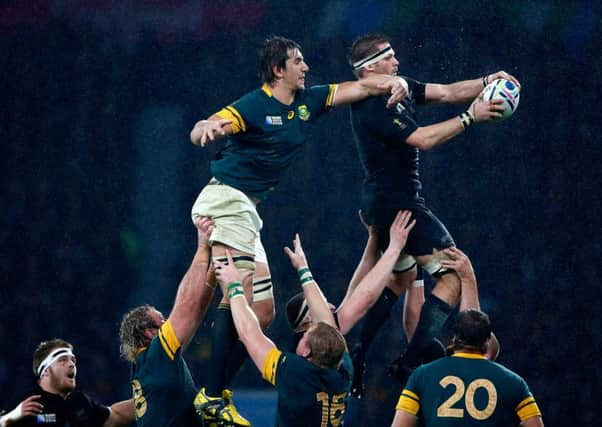Simon Taylor: All Black-Springbok clash was purist’s classic


The layers of personality, charisma and achievement on both sides added extra depth to the actual rugby.
A lot of the excitement in a game of this magnitude actually comes from the absence of time and space, and from the knowledge that a single mistake by any player could be the deciding factor. In this case, you might pinpoint the knock-on by Schalk Burger in his own 22, eventually resulting in the All Blacks’ second try, as being the crucial error. Burger himself highlighted it after the match, and seemed fairly philosophical about it.
Advertisement
Hide AdAdvertisement
Hide AdHis story of having recovered sufficiently from life-threatening bacterial meningitis in 2013 to become one of his country’s best players in this World Cup-is almost beyond belief, and could provide an explanation for his sanguine acceptance of his mistake. But I reckon it’s more about an all-time great realising that, when you put your hand up as often as he does, you know the stakes.
You are increasing your individual exposure to risk, but at least you won’t go out with regrets about hiding or shirking your responsibilities.
The great players take on that extra responsibility. Dan Carter could have shovelled that messy ball from a stolen lineout to Ma’a Nonu to truck up, but instead magicked up a drop goal for what proved to be the decisive three points.
Elsewhere, Carter and his team were noticeably conservative, happy to probe away in front of the Springbok defence, rather than playing through them as they did against the French, before poking countless little grubbers in behind and hoping for a mistake in the rain. There was comfort for the rest of the rugby world in seeing them brought back to mere mortal status, but also a reminder from South Africa about how much can be achieved in the sport through sheer will and character. Their big players certainly showed up, but you wonder whether the inclusion of another legend, Victor Matfield, might have closed that two point deficit.
The Springbok lineout looked shaky for the first time in the tournament (they even had to employ Eben Etzebeth as a jumper in order to secure ball) and you just feel that Matfield would have hoovered up those crucial lost throws.
This is slightly more left-field, but would it have been possible to reintegrate Morne Steyn into the matchday squad in case of an occasion like this, when Handre Pollard didn’t look quite authoritative enough and tactical kicking was so vital? Steyn has had an average couple of seasons, but he’s another player to have pulled it out of the bag in big games in the past.
The Argentina versus Australia match was more open, but somehow it didn’t feel like a “proper” semi. Argentina looked like a team who didn’t genuinely think they could win, and that they would go out, give it a lash, and hope for the best. Ironically, if they had shown a little more of their traditional pragmatism, they have the kicking game and forwards to have caused Australia problems. While you have to admire their elan, it’s just frustrating that they didn’t take a bit more care of their achievements in this World Cup.
On top of that, it was frustrating to know that Scotland could have at least matched this Pumas side. But, having come so close, there were key things to take away from the weekend which could possibly help Scotland in future big matches. We all might have had a close eye on kick-off receptions, and it was interesting to see South Africa setting up with four pods of two (a lifter and a jumper) along the ten metre line, giving New Zealand no easy kick. Australia, meanwhile, have used Adam Ashley-Cooper as a receiver throughout the tournament. He is great in the air and so easy to lift high that he often ends up taking the ball at chest height rather than above his head, a far more difficult skill. You can imagine Tommy Seymour taking on a similar role.
Advertisement
Hide AdAdvertisement
Hide AdIn general play, how much easier could Scotland’s passage have been with a few more turnovers at the breakdown?
It’s a truism, but a steal when Australia were hammering away at our line would have been as good as a try. Part of the problem might be that John Hardie, our most likely to “jackal” (that’s the jargon these days) is often the one having to put in the big hits and slow the opposition’s momentum. It’s hard, although not impossible to get on the ball if you are the first tackler and it was fascinating at the weekend to watch Francois Louw and David Pocock floating around near the ruck, casual as you like, just waiting for the right moment to pounce.
For Hardie to be able to do the same requires a slight improvement in our ruck defence but in addition it will help to have a second top-class “jackal” in the team, which Alex Dunbar’s return will provide, in addition to increased involvement for Fraser Brown. Refs are allowing more of a contest at the breakdown and it seems to me that recognised masters of the art are given particular leeway, almost as if they are the designated pincher.
It is definitely something Scotland can adapt to before the Six Nations, as Pocock has proved that it can be a building block of success.